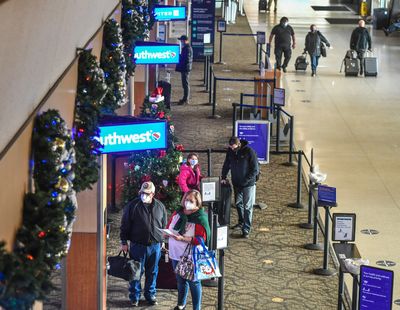Spokane International Airport and Department of Ecology at odds a month from PFAS cleanup deadline

A month removed from the first PFAS cleanup deadline, it remains unclear whether the Spokane International Airport will adhere to the process mandated by the state Department of Ecology.
The dangerous chemicals have been used in firefighting foam at both the airport and Fairchild Airforce base, leading to decades of exposure for people on the West Plains. A six-month negotiation between the airport and state agency ended with Ecology unilaterally placing the airport into an order requiring an investigation identifying the magnitude and extent of contamination at the site and a feasibility study comparing methods to clean up the contamination.
Spokane International Airport has yet to indicate if it will comply with the order, citing perceived conflicts between Ecology’s order and Federal Aviation Administration regulations.
“Based on their current assessment of the proposed Agreed Order, FAA has expressed its view that the Order likely violates the federal law,” lawyer Brian Werst wrote in a March letter to Ecology on behalf of the airport.
Obtained by The Spokesman-Review, the FAA guidance given to the airport paints a more nuanced picture that seems to permit Ecology regulation in many cases.
According to the letter, FAA requirements for airports “do not, in general, implicate an airport’s obligation to comply with applicable environmental laws.”
“In general, there is no bar on an airport using its own revenue to discharge its legal liabilities or to settle cases even where liability has yet to be adjudged,” wrote FAA program manager Warren Ferrell.
The only instances cited in which airport grants could be put in jeopardy from spending revenue on the PFAS cleanup are if the airport, “has no plausible liability” for the contamination or if a lien is placed upon them by Ecology.
In a statement, airport spokesperson Todd Woodard said the airport “continues to evaluate” the FAA guidance. He also cited an EPA memorandum earlier this month, which states the federal agency will not pursue publicly owned airports for their PFAS contamination.
“State or municipal airports and local fire departments provide a public service by preparing for and suppressing fire emergencies and protecting public safety,” reads the April 19 EPA memo. “They do not manufacture PFAS nor use PFAS as part of an industrial process. Many airports and fire departments, however, store and use aqueous film forming fire-fighting foam that may contain PFAS. Many airports have been required by Federal Aviation Administration regulations to maintain adequate amounts of AFFF to address fire emergencies.”
In his statement, Woodard wrote that the EPA “recognizes that airports are not responsible for the contamination on their property caused by a product they were required to use.”
Nevertheless, the Department of Ecology does not believe anything in the FAA guidance prevents the airport from following the Enforcement Order.
“We expect the airport to follow the deadlines outlined in the order,” Ecology spokesperson Stephanie May said in a statement.
The FAA guidance also recommends Ecology’s order acknowledges Federal safety and access restrictions that may take precedence in the “rare instances in which conflict may arise.” According to May, that language was added before the order was issued.
“We do not anticipate the need to amend the order further,” she said.
Under the enforcement order, the airport is required to submit its first report as part of the cleanup process on May 28. Though asked if they plan to comply with the enforcement order, Woodard did not address the question in his statement to The Spokesman-Review.
The FAA letter does note the airport has the option not to agree to the order if they believe Ecology is “refusing to negotiate reasonable terms in good faith.”
In a letter sent to Ecology the day before the enforcement order was put in place, airport attorney Brian Werst called Ecology’s actions “arbitrary, capricious, and unlawful.” According to Ecology, the agency has not received any communication from the airport since that March 28 letter.
Without compliance to the order, the matter could end up being adjudicated in a court of law.
“If we have to do that, it’s my understanding that if the court were to side in Ecology’s favor, there are substantial monetary damages for which the court would impose on the airport,” Ecology site manager Jeremy Schmidt said in a March interview.